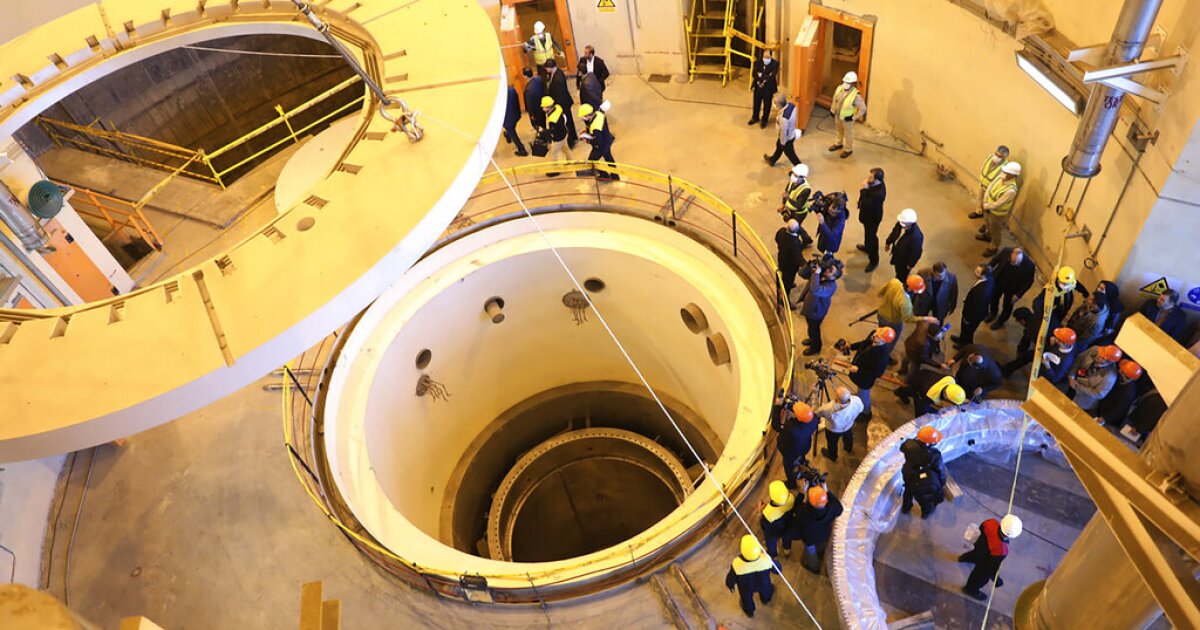

Iran has backed off a demand that international inspectors close certain investigations into its nuclear program as a condition for returning to the Iran nuclear deal, according to a senior administration official, abandoning a major sticking point.
Iran’s decision suggests negotiators may be nearing an agreement to reenter the 2015 deal after convening a make-or-break push in August. The U.S. on Tuesday was still weighing its answer to Iran’s response to an updated draft text described as the West’s final offer.
For months, Iran insisted that the International Atomic Energy Agency cease its investigation into undeclared nuclear material found at Iranian sites as a condition for reentering the Joint Comprehensive Plan of Action, a prospect ruled out by IAEA Director-General Rafael Grossi. Its failure to cooperate with the IAEA’s inquiries prompted the inspection body to issue a formal resolution in June.
But Tehran has now relinquished the provision, a senior administration official told the Washington Examiner, one of several concessions on critical issues.
Despite remaining “gaps,” the U.S. official touted the prospect that Iran would be forced to take “many significant steps” to dismantle its atomic program. The Biden administration believes the deal is a national security imperative that will limit Iran’s nuclear advances.
“They came back last week and basically dropped the main hang-ups to a deal,” a senior U.S. official told Reuters, which first reported the development. “We think they have finally crossed the Rubicon and moved toward possibly getting back into the deal on terms that President Biden can accept.”
CALIFORNIA DEMOCRATS EYE NEWSOM ATOP A 2024 TICKET IF BIDEN DOESN’T RUN
Suggesting the negotiations had entered a more serious phase, President Joe Biden two days ago spoke with the leaders of European countries involved in the original deal. On Tuesday, the president’s national security adviser discussed with his Israeli counterpart threats from Iran and Iranian-backed proxies to Israel, according to a White House readout.
Iran has also moved away from demanding, as it did earlier this year, that the U.S. remove the Iranian Revolutionary Guard Corps from its list of Foreign Terrorist Organizations, which was omitted from the latest versions of the text, according to the senior official. Biden had called this a firm line, pledging in a July interview with Israel’s Channel 12 to maintain the sanctions even if it kills the deal.
More challenging is Tehran’s demand of a guarantee that no future U.S. administration can leave the deal, an assurance that Biden is unable to grant.
Iran has publicly claimed its own concessions, with top Iranian spokesman Seyed Mohammad Marandi stating on Sunday that Iran achieved “huge progress” in “sanctions issues.”
Marandi on Tuesday disputed the claim Tehran was backing away from positions in order to reenter the deal.
An adviser for Iran’s negotiating team, Marandi called “misleading” the charge that Tehran had abandoned its push to end the IAEA probe and delist the Revolutionary Guard.
“No deal will be implemented before the IAEA Board of Directors PERMANENTLY closes the false accusations file,” Marandi wrote on Twitter.
“Of course, this doesn’t mean Iran won’t cooperate to help close the case,” he added in a subsequent tweet.
Others have questioned the U.S. claim that Tehran has abandoned its hold on the probe, stating that this claim over-interprets Iran’s decision to forgo an upfront guarantee over the issue in its Aug. 15 response to the European Union’s draft text. A reporter for the Wall Street Journal said Iran had not dropped the issue and that it may remain a sticking point.
And while the senior official suggested Iran had backed off a demand over the IRGC listing, Morandi said the issue was long resolved.
Removing the Revolutionary Guard from the list of Foreign Terrorist Organizations is not a “precondition” for agreement, Marandi wrote Tuesday, noting he had said this “for MONTHS.”
Delisting the Corps to restore the deal would prove intensely contentious, with Biden privately ruling it out in April over opposition from Congress and the group’s ongoing threats to Americans.
The Trump administration exited the deal in 2018 and reimposed sanctions on Iran as part of a “maximum pressure” campaign. It labeled the IRGC a terrorist organization in 2019.
While the Biden administration would have to lift some sanctions to return to an agreement, a senior administration official called “categorically false” any suggestion that Washington would concede anything beyond the scope of the original 2015 deal. Iran is the party conceding on critical issues, the official said.
Asked about a timeline for the U.S. response, a national security council spokesperson responded that the talks “languished for months” due to Iran and called “absurd” any premise that Washington was now dragging its feet.
There remain outstanding issues still, the spokesperson said.
“We are currently doing our homework and will respond at an appropriate time and after our internal process is complete,” she added. “No sooner.”
The back-and-forth over the IAEA probe comes as Washington and Tehran work to sell a potential deal back home.
“The technical track is a hostage of the political one,” said Behnam Ben Taleblu, a research fellow at the Foundation for Defense of Democracies, explaining that the U.S. and Iran have indirectly sought to “subordinate” the IAEA’s technical negotiations to the political talks taking place in Vienna.
“Deal or no deal, all eyes will be on Grossi and the IAEA board to see how firm he holds,” Taleblu added.
Biden faces additional considerations ahead of the midterm elections, with Republicans promising to reverse sanctions relief for Iran if the party retakes control of Congress.
In the meantime, a rollback of sanctions could bring relief to European energy prices which have surged to record levels as supplies tighten. Iran holds the second largest gas reserves in the world behind Russia, the U.S. Energy Information Administration estimates.
CLICK HERE TO READ MORE FROM THE WASHINGTON EXAMINER
Bringing online Iran’s unused oil capacity of 1 million barrels per day would be a gradual process and likely take about one year, energy analyst Greg Priddy said. Reports indicate the process could begin within 120 days of signing an agreement on a return to a deal.
The White House did not respond to a request for a potential timeline for bringing Iranian energy to market if an agreement is reached.







